As a child who loved reading, it was sometimes difficult for me to find fantasy or sci-fi books with female protagonists. So many of the fairytales I grew up with utilized the “damsel in distress” trope, and there weren’t that many strong woman characters to idolize or emulate. The closest I came to a “main” female character I actively rooted for was Lyra Silvertongue from Philip Pullman’s His Dark Materials.
It took me a few more years to realize how the science fiction and fantasy genres have been largely dominated by white men. Nevertheless, the contributions of women have been invaluable in shaping the trajectory of both mediums. More importantly, woman authors continue to use the speculative medium to highlight the inequalities of a patriarchal society and imagine sustainable alternatives to it. Recent efforts in promoting inclusion and diversity in the publishing industry have ensured that more woman-identifying writers (from the past and present) get the spotlight they rightfully deserve.
So, if you’re in the mood for speculative books written by women that focus on the issues they face or are from the point-of-view of female characters making the best of their circumstances, these novels can be a useful starting point. With both light-hearted and heavy reads, I hope this list will encourage you to read more widely and discover more diverse works!

Sultana's Dream
An underrated feminist classic, Sultana’s Dream was first published in a magazine in 1905 by Begum Rokeya at a time when India was still ruled by the British. The novella depicts a sci-fi feminist utopia called “Ladyland” where traditional gender roles are reversed—the women can drive flying cars and harness the power of solar technology while the men are locked away at home. Rokeya who was initially prevented from learning English and Bengali, nevertheless managed to write this story when she was just 25, gently and humorously debunking gender stereotypes and advocating for women’s liberation within a patriarchal and colonial society.
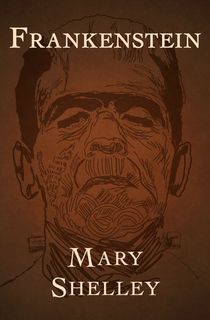
Frankenstein
Mary Shelley’s 1818 novel, Frankenstein, written as she grappled with the trauma of a miscarriage, sort of kickstarted the sci-fi genre. It’s a haunting story about how scientific technology is utilized to create a sapient creature, and the horrifying consequences that result from the illegal experiment. Written in an epistolary and nested format, the letters in the novel reveal the tragic story of Victor Frankenstein who creates the “monster” and then promptly shuns it—and the monster, having known no kindness or mercy from the world, goes on a vengeful rampage, hunting down his family members one by one. A cautionary tale that combines Gothic horror with sci-fi elements, Frankenstein still remains a popular classic.
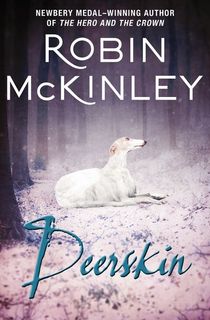
Deerskin
Robin McKinley is famous for her evocative fairytale retellings, and in Deerskin (which is based on an old French tale), she skillfully delves into darker topics of incest, rape, and miscarriage, weaving a stunningly poignant narrative about trauma healing and womanhood. The book focuses on Princess Lissar whose captivating beauty draws her father’s attention; following his wife’s death, he becomes hellbent on marrying his own daughter. Lissar eventually manages to escape, and begins the slow process of healing, with the help of nature spirits and the goodwill of strangers. Despite its disturbing themes, the book is ultimately hopeful, asserting that recovery is indeed possible, and the novel is sure to strongly resonate with trauma survivors.
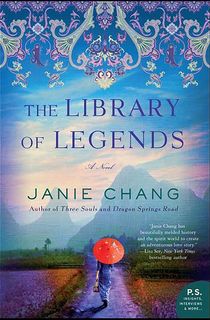
The Library of Legends
Janie Chang’s The Library of Legends is a poetic historical fiction novel, tinged with magic realism, that takes inspiration from the Second Sino-Japanese war. It follows a group of students trying to flee from the horrors of battle, following the Japanese invasion of China during World War II. The narrative focuses not just on the characters as they struggle to survive, but also on the attempts to preserve Chinese fables and folklore—vital aspects of culture and national identity that such wars seek to efface. Overall, this is an enthralling read with a star-crossed romance also thrown into the mix!
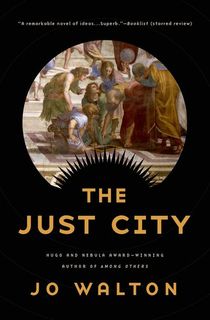
The Just City
If you enjoy philosophy and thought experiments, you should check out The Just City by Jo Walton, the first entry in her Thessaly trilogy. In this sci-fi novel the “Just City” is a far-future planned community, set up by Pallas Athene as an experiment to re-create Plato’s “Republic." The story unfolds from three perspectives, tackling important philosophical themes and featuring a Greek pantheon that can travel through time. Walton's entry on this list is a rather strange, lovely, and thought-provoking book.
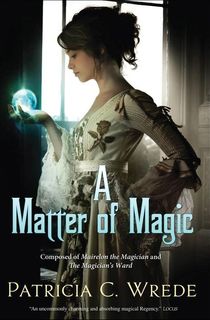
A Matter of Magic
Patricia C. Wrede’s A Matter of Magic collects two of her books, Mairelon the Magician and Magician's Ward, in a single accessible volume. The first part follows Kim, a London street urchin and thief who disguises herself as a boy to get by. However, when an attempt to rob a magician goes awry, she’s offered the chance to become his apprentice instead. In the second book, Kim slowly comes to her powers as a magician and has to adjust to life as a lady (she can no longer pretend to be a boy), even as she’s pulled towards an evil plot. Set against the charming backdrop of Regency England, A Matter of Magic is a rather delightful and engrossing read.

The Goddess Chronicle
Finally, Natsuo Kirino’s The Goddess Chronicle is a heart-breaking and bittersweet tale of revenge that reimagines the traditional Japanese creation myth of Izanami and Izanaki. The story follows two sisters—one famed for her beauty and chosen to be the next Oracle, while the other is forced to serve in the underworld. Kirino masterfully combines vivid descriptions of banal village life with the trauma of unexpected betrayals and losses, weaving an emotionally vibrant narrative that will surely haunt you long after you’ve closed the book.
If you’re in the mood for a short read that richly explores rage and grief and eschews a popular happily-ever-after for a more gritty and realistic ending, The Goddess Chronicle is the book for you.


